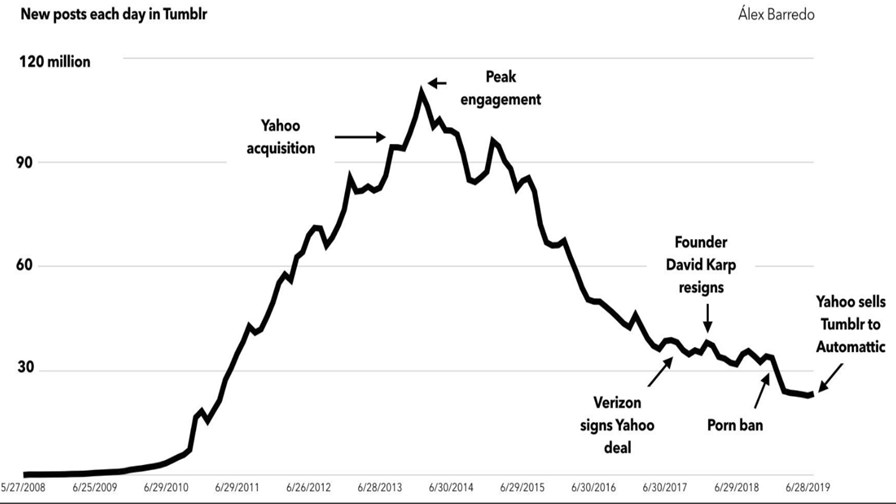
via Flickr © JeepersMedia (CC BY 2.0)
- Yahoo bought Tumblr and Verizon sold it for a fraction of the original price
- Verizon seems to be getting the blame for the loss, but in fact Tumblr’s decline set in under Yahoo and was not because of the decision to drop the porn
- Let’s review the evidence
Back when media companies thought that buying into social media was a passport to the future, Yahoo, mostly a search site, bought Tumblr (a micro-blogging site - a sort of cross between Facebook and Twitter) in 2013 for $1.1bn (£910m).
Then, when telcos thought buying up online content companies was the way forward to make good on their digital service provider strategies, Verizon bought Yahoo complete with Tumblr in 2016 (are you following?) for $4.83 billion. At that point, Yahoo had a global audience of 1 billion monthly active users, including 600 million monthly active mobile users.
Now, Verizon has just kissed goodbye to Tumblr for what is estimated to be around $3 million (that’s million with an M). Keep in mind that Tumblr was initially considered an important added component to the Yahoo brand when that company was making a string of expensive purchases under the direction of its then CEO, Marissa Mayer.
That means that the stewardship of Tumblr by Yahoo and Verizon between them (mostly Yahoo, it has to be said), has seen the almost complete value destruction of Tumblr, from $1.1 billion - it’s purchase price in 2013 - to chump change today.

Tumblr's demise: source Alex Barredo, Twitter
When Yahoo bought Tumblr in 2013, it was riding high with over 90 million new posts on its platform each day. That growth continued for a short time (see chart) and then began a precipitous decline through to about 2017 when Verizon finally closed its deal for Yahoo.
By this point posts were way down, to just over 30 million per day and the other marks and measures for social media success (revenues) were down in proportion.
Tumblr’s founder, David Karp, who had stayed at the company through the Yahoo years (despite the precipitous decline), held on for a bit under Verizon and then left. The notorious (at least for some Tumblr users) decision to ban pornography from the site, seems to have caused another slide in postings (rather than the uplift that Verizon was presumably looking for) and Tumblr was by earlier this year at 20 something million postings a day when presumably Verizon thought it could steady the ship and achieve a renaissance. As it found it couldn’t reboot it, Verizon decided a sale rather than suffer the embarrassment of further decline, was the best option.
Many observers have been pointing to the porn ban as the reason for Tumblr’s decline, but as Alex Barredo illustrates with his chart, the rot had set in well before that - posting declines can be taken as an early warning sign of major illness, analogous to clogging arteries, perhaps in advance of other, more drastic symptoms.
So does this mean that telcos simply aren’t a fruitful home for content or social media? On the face of it Yahoo/Verizon both made a pig’s ear of their investments, but in fact Yahoo, not Verizon, was the real butterfingers here.
Yahoo already had the right sort of Silicon Valley culture and understanding of social media that should have seen it do better with Tumblr. Instead it suffered huge posting declines and seemed unable to right the ship. Why?
As we’ve seen with other social media properties or ‘brands’ once a vibe sets in that a particular site is no longer ‘hot’ or cool or fashionable, perhaps because of the image of the parent company, it’s very hard to turn it around. In social media success can be fleeting and seemingly small failures are often terminal.
For that reason the current proud owner of Tumblr, Automattic, the web services company which runs the blogging platform Wordpress, seems to have the credentials to do better. Can it?
Email Newsletters
Sign up to receive TelecomTV's top news and videos, plus exclusive subscriber-only content direct to your inbox.




